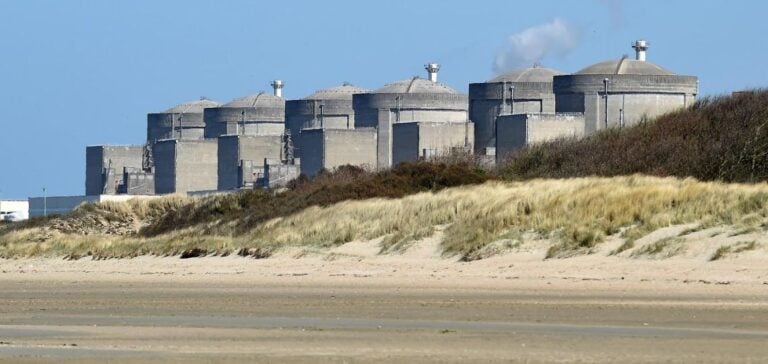Greenpeace activists entered the vicinity of the Gravelines nuclear power plant in northern France on Monday morning, aiming to raise awareness among the public and authorities about potential marine submersion risks. Arriving on two boats via the plant’s discharge canal, the activists displayed banners with the message “Rising seas, nuclear under water” and used smoke grenades to symbolize the rising water levels. The demonstration included kite designs shaped like jellyfish, enhancing the visual impact of their action.
EPR reactors in the spotlight
Greenpeace voiced its opposition to the plan to install next-generation EPR2 reactors at this site. These reactors, each with an anticipated capacity of 1,600 MW, are intended to be built on an 11-meter-high platform to withstand extreme flooding. However, the NGO questions this protection, arguing it is insufficient to counter climate change-related sea level rise predictions.
Submersion risks for Gravelines
The Gravelines plant is near Dunkirk, in an area particularly vulnerable to flooding. According to Greenpeace, the site could fall below sea level by 2100 during high tides combined with extreme weather events, as highlighted in a report published by the NGO in early October. The report claims that both existing and future reactors could experience temporary flooding, thereby increasing risks for surrounding populations and the environment.
Arrest of activists
During the intrusion, around ten activists landed on the northern dike of the plant and were quickly apprehended by security forces. Other participants located outside the site were also detained by the police. The prefecture confirmed that the activists did not manage to enter the plant buildings but remained in the vicinity, specifically near the water discharge area.
EDF’s response on safety measures
EDF, the plant’s operator, assured that the height of the platform for future EPR2 reactors was calculated to withstand the most extreme floods foreseen in the scenarios developed by the Intergovernmental Panel on Climate Change (IPCC). The company defended the plant’s safety, stating that the measures taken account for climate risks. EDF emphasized that the platform’s elevation and associated infrastructures meet the highest standards to mitigate potential impacts from sea-level rise.
Public debate and political reactions
The EPR2 reactors project at Gravelines is currently the subject of a public debate initiated in mid-September, gathering experts, associations, and local representatives to discuss safety and environmental impact issues. Greenpeace seized this opportunity to draw attention to the potential consequences of this project in a region already sensitive to flooding. The debate over the social and ecological acceptability of these new reactors intensifies as voices rise to criticize risk management in the French nuclear sector.






















